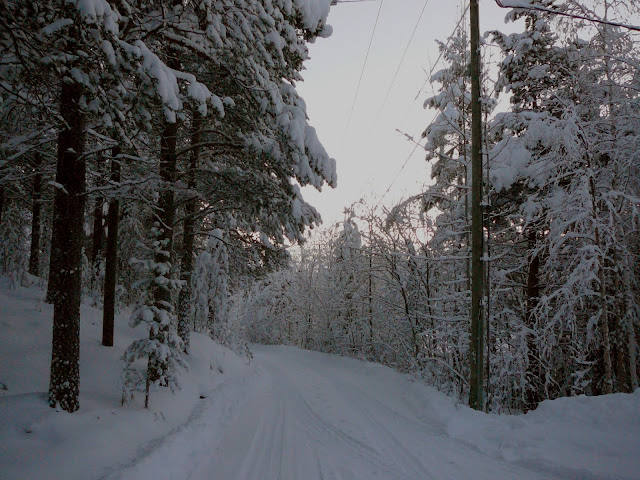Levi-Finland, a small town 170 km north of the polar circle. Last time I was in Lapland was at least 14 years ago.
What was more striking for me was the passing of time; fourteen years and I didn't even acknowledge that so many years went by. It felt like something was stolen from me, and it was the most important thing ever: my time.
However, going back it felt like coming back to those times, when, also for me, those places were new and exotic.
The old railway station of Rovaniemi was still the same old wooden building frozen in time, and like the first time I arrived there, it was dark and foggy.
I stood there for a while looking around me, letting all the memories coming back from the past, allowing the sensation to overwhelm me.
I closed my eyes, and I opened them once again with a smile on my face.
Everything felt good, even the least pleasant memories could not spoil that perfect moment of having back something of my past.
I walked to the bus station, where the bus would have brought me from Rovaniemi to my final destination: Levi.
Describing the trip would be impossible, as I fell asleep almost immediately. Despite the fairly good sleep on the night train, I felt like I needed some more sleep. Besides, I have always found extremely soothing the movement of a bus.
The cottage I rented was like something you would see in a postcard. For a moment I wished to own a cottage like that, but thinking twice, and recalling my thirst for traveling to discover different places, I considered the purchase rather obsolete; I would use it too few.
The first afternoon was spent looking around; the town is tiny for being a touristic ski resort, but on the other hand, Finland doesn't have any city that can be considered "big."
The capital, Helsinki, holds less than 600 000 inhabitants and the whole Finland only about 5500000, something that in many countries is the amount of the inhabitants of one single city or county.
Nevertheless, this is a great plus, having the possibility to live in a place where the woods are just on your backdoor.
When I can say that the silence of the capital is something comforting, there in this small town in the middle of nothing the silence was even inspiring.
I know I should have used this opportunity to continue my book or other projects; the problem was that nature was calling, and at that call, it was impossible to resist.
I went for long walks until I decided something different; going to ride Icelandic horses.I fell in love once again; as those animal are the sweetest creatures, and I connected immediately with the one assigned to me.
I was in a group of about ten people who were going to ride on the same day. People who have been riding horses for all their lives or who never even saw a horse from real.
Nevertheless, considered the mild nature of those horses, it is easy to understand that there is no need to be an expert horseman to go for a ride.
The weather was fantastic, the sunshine... (ok, not much of sun, for being that North) the perfect blue sky, and the freezing cold (-10C).
It felt like living in a postcard, one of those you see on the commercials for arctic safaris or holidays. Those images so perfect you believe that they are made up to entice customers.
It was easy to get lost in the admiration of those wonders, almost forgetting to be on horseback walking around.
It was also easy to forget the low temperatures and other earthly feelings, like the hunger, just to cite one.
If it weren't for the beauty of the sceneries, the fun we had riding and the proper clothes, I think I would have never been able to enjoy anything of those two hours ride.
Nevertheless, considered the mild nature of those horses, it is easy to understand that there is no need to be an expert horseman to go for a ride.
The weather was fantastic, the sunshine... (ok, not much of sun, for being that North) the perfect blue sky, and the freezing cold (-10C).
It felt like living in a postcard, one of those you see on the commercials for arctic safaris or holidays. Those images so perfect you believe that they are made up to entice customers.
It was easy to get lost in the admiration of those wonders, almost forgetting to be on horseback walking around.
It was also easy to forget the low temperatures and other earthly feelings, like the hunger, just to cite one.
If it weren't for the beauty of the sceneries, the fun we had riding and the proper clothes, I think I would have never been able to enjoy anything of those two hours ride.
After all, I also started to feel homesick; it is good to go but is also good to come back to the comfortable routine and all the things that mean "home."







































